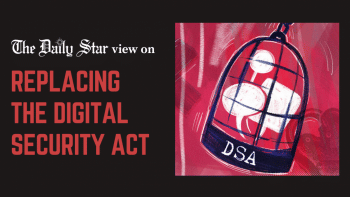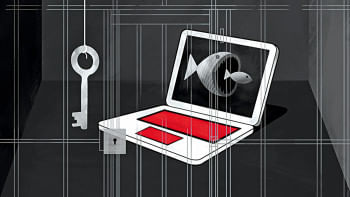We don’t want more people in jail for their posts on the internet

As someone who has actively campaigned against the many abuses that the Digital Security Act (DSA) has instrumentalised since its introduction, I would have been pleased had the law or at least the most problematic sections been repealed, but we are nowhere close to it. Instead, the DSA is being renamed to Cyber Security Act (CSA) with some cosmetic changes and hefty fines.
Law Minister Anisul Huq's press briefing highlighted that most penal actions or the jail terms are being replaced with fines, and he suggested that the failure of paying the fines could amount to three to six months' imprisonment. Upon a quick review of the draft of the CSA, I found to my dismay that most of the problematic penal actions of the DSA are retained in the CSA.
For example, the penalty for Section 21 of DSA, which stipulates a 10-year imprisonment for using "propaganda" against Bangladesh's Liberation War, the first president of the country, the national anthem, and the national flag, will be reduced to seven years. The penalty for Section 25, which stipulates a three-year imprisonment for transmitting "offensive, false or threatening" information, will be reduced to two years.
Reducing jail terms from 10 years to seven years or from three years to two years does not change the nature of the law. The use of criminal punishment in the CSA for what may constitute a legitimate form of expression has the same concerns as the DSA on this day.
In fact, the prison data that I obtained in July 2021 under the Right to Information Act indicates that most prisoners of the DSA (185 to be precise) were targeted under Section 25, followed by Section 31 (data causing "enmity, hatred and hostility"; 163 prisoners), Section 29 ("defamation"; 162 prisoners), Section 28 ("hurting religious sentiment"; 40 prisoners) and Section 21 ("propaganda"; 13 prisoners).
This is only so far as the data indicates. What about the human rights violations induced by indefinite pre-trial detention and sessions of hearing? Renowned photographer Shahidul Alam, who was charged under the now non-existent section 57 of the Information and Communication Technology (ICT) Act for his criticism of the government in a televised interview in August 2018, still attends court every month. A jail term of 14 years still hangs over his head if convicted in the obsolete law. What's the legitimacy of a trial under a non-existent law?
No one should forget the price writer Mushtaq Ahmed had to pay with his life for sharing his criticism of the government on a Facebook post. He died in custody of the state authorities after being detained for 10 months. His colleague, who was detained on the same charges but released on bail shortly after Mushtaq's death, said that they both were tortured in custody of a state security agency.
Any government that is genuinely concerned by human rights abuses would take lessons from its mistakes and make sure that they do not repeat these. Instead, we see that the government is taking the same route as it did in the past, drafting the Cyber Security Act and attempting to hastily pass it in parliament, just like it did with the Digital Security Act ahead of the 2018 election.
Raising the fine and removing the jail term for defamation is nowhere close to rectification of the DSA. The reason defamation law has been abused is because a third party can file a defamation case under the DSA in the pretext of claiming defamation of another individual. The government should make sure that no one but the affected person can file a defamation suit in a civil litigation on grounds that clearly demonstrate the personal harm.
The High Court on August 8 ordered a stay of proceedings in the DSA case against environmental activist Shahnewaz Chowdhury, who raised his concerns about a coal-fired power plant in his neighbourhood in Banshkhali, Chattogram. Had the government not weaponised the ICT Act and the DSA, Mushtaq would not have had to lose his life for his words, Shahnewaz Chowdhury and Shahidul Alam would not have had to spend time in jail for their words. But the government does not seem to have any remorse.
Except for defamation, the government has retained the penal actions against all the sections of the DSA discussed above. In case of defamation, the government has proposed an increment of the fine from Tk 10 lakh to Tk 25 lakh. At this rate, fines from DSA might become an alternative source of the national revenue.
Raising the fine and removing the jail term for defamation is nowhere close to rectification of the DSA. The reason defamation law has been abused is because a third party can file a defamation case under the DSA in the pretext of claiming defamation of another individual. The government should make sure that no one but the affected person can file a defamation suit in a civil litigation on grounds that clearly demonstrate the personal harm.
A political party mindful of public interest would aim to do away with harmful pieces of legislation and place human rights at the heart of its campaign. In line with those actions, the government would make sure that the next piece of legislation is transparently reviewed by a wide range of stakeholders, including members of the media and civil society. Only after those reviews are publicly discussed and incorporated should a law be sent to parliament for approval.
The government should do away with the criminal punishment for expressions entirely, and make cybersecurity specific to criminal offences such as child pornography, stealing of protected personal data, and financial crimes. We don't want to see more people being jailed for their posts on the internet.
Saad Hammadi is Global Governance Fellow at the Balsillie School of International Affairs, University of Waterloo, and a human rights advocate. He can be followed on X at @saadhammadi

 For all latest news, follow The Daily Star's Google News channel.
For all latest news, follow The Daily Star's Google News channel. 











Comments